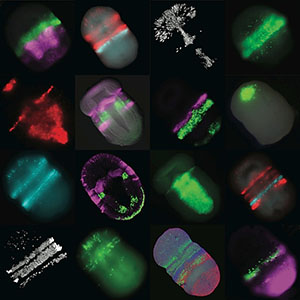Outstanding Early Career Scientists are Selected for MBL Whitman Investigator Awards

The Marine Biological Laboratory (MBL) has announced the recipients of the new Whitman Center Early Career Awards, established to enable exceptional scientists early in their careers to conduct research at the MBL and take advantage of its resources and the convening power of its scientific community.
The five awardees will be supported for up to four months to pursue research that addresses the MBL’s current strategic vision and initiatives in marine organisms and imaging.
 Gene activity in the acorn worm embryo. Credit: Ariel Pani
Gene activity in the acorn worm embryo. Credit: Ariel Pani“We are delighted to attract these bright new investigators to the Laboratory, who were selected from a highly competitive pool of applicants,” says Jonathan Gitlin, Director of the Division of Research at MBL. “Each awardee will establish a unique research program that we are certain will catalyze new and exciting discoveries.”
The Whitman Center awards are named after scientist Charles Otis Whitman, founding director of the MBL in 1888 and later a faculty member at the University of Chicago.
The 2016 Whitman Center Early Career Awardees are:
J. Matt Dubach (Massachusetts General Hospital/Harvard Medical School): to develop new methods to measure neural activity in any organism using fluorescence polarization microscopy and membrane voltage sensitive dyes.
Jessica Gray (Harvard Medical School): to study the marine acorn worm Saccoglossus kowalevskii to investigate the role of microRNAs in evolutionary development and regulation.
Stephen Andrew Green (California Institute of Technology): to utilize Saccoglossus kowalevskii to investigate the evolution of vertebrate cranial muscles through gene regulatory studies.
Paul Joseph Minor (Hopkins Marine Station, Stanford University): to examine marine organisms and explore the evolutionary role of gene regulation in early vertebrate brain development.
Brandon Weissbourd (California Institute of Technology): to use a transparent marine organism that provides a clear behavioral readout of internal states to image neural network dynamics during behaviors.
—###—
The Marine Biological Laboratory (MBL) is dedicated to scientific discovery – exploring fundamental biology, understanding marine biodiversity and the environment, and informing the human condition through research and education. Founded in Woods Hole, Massachusetts in 1888, the MBL is a private, nonprofit institution and an affiliate of the University of Chicago.